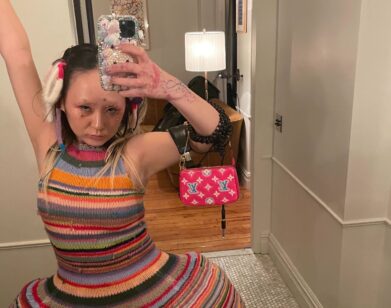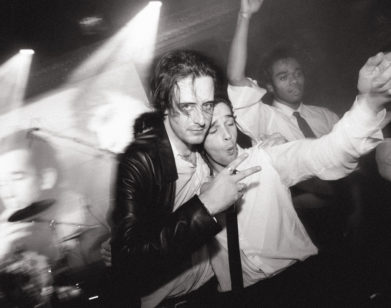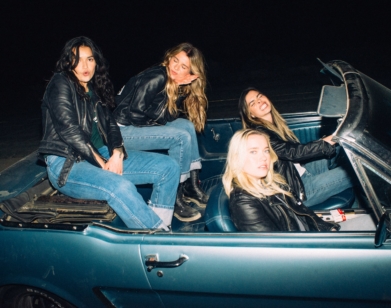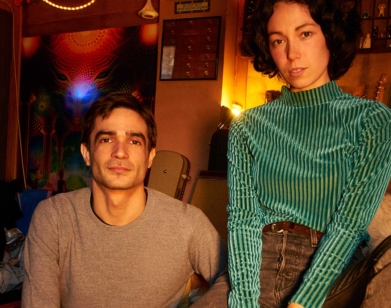IN CONVERSATION
Kelly Lee Owens and George Daniel on Coffee Beans and Club Classics
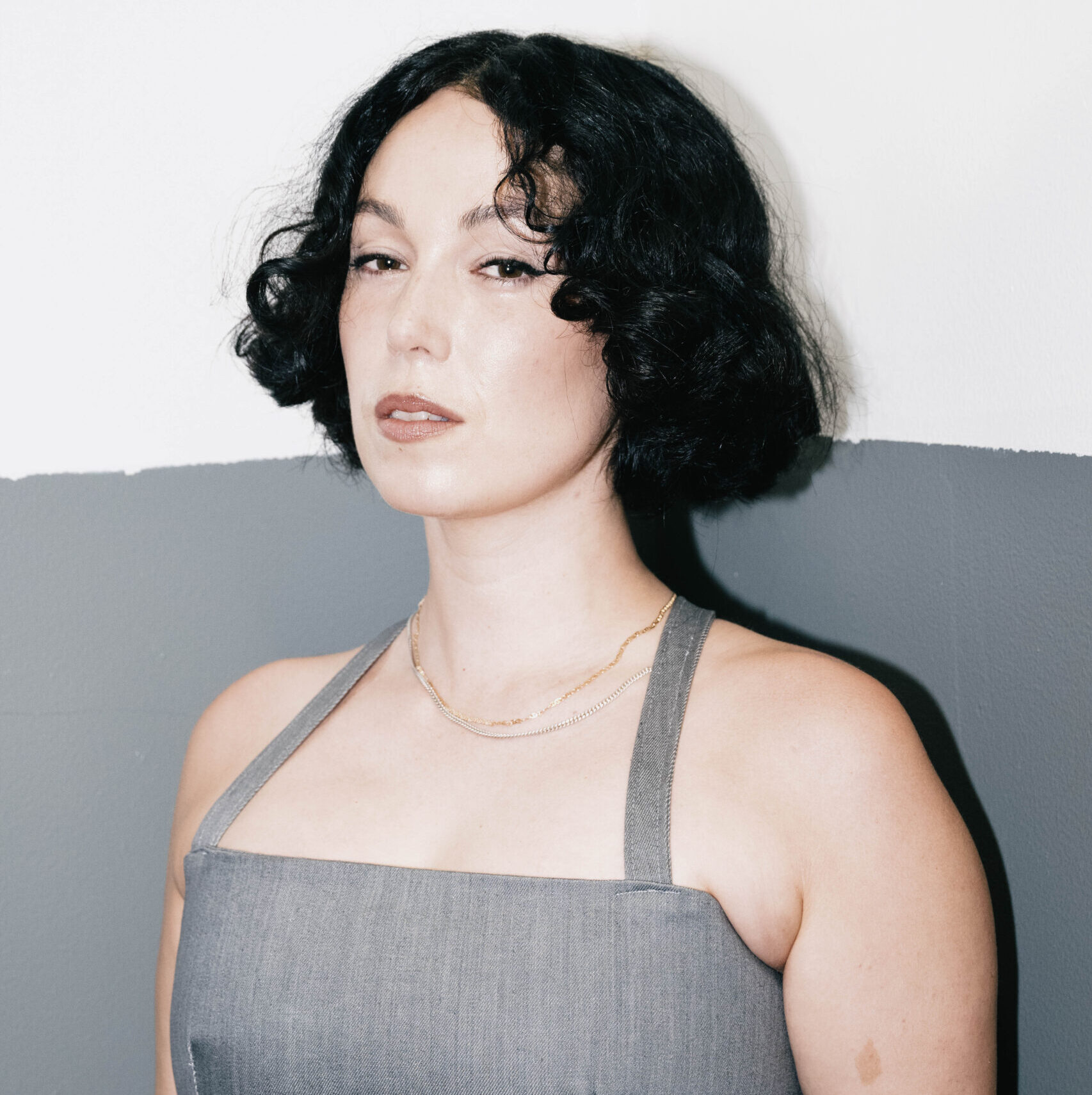
Kelly Lee Owens, photographed by Jordan Curtis Hughes.
The newest studio album from musician Kelly Lee Owens produces the titular sensation: Dreamstate. The record, her fourth full-length, is an intricately produced vehicle for escapism, stacked with sensory tension and syrupy-sweet vocals that induce the kind of spiritual hallucinations one might have at the club. The Welsh-born, London-based musician cemented her place in electronic music history some time ago, scoring star-spangled collaborations with the likes of Bjørk, John Cale, and Jon Hopkins. This time, she’s taken a popier, more upbeat approach to the album, which was released last week under dh2, the label helmed by George Daniel, drummer for the 1975 and fiancé of Charli XCX. A couple of weeks before album’s release, the two got together to talk perfectionism, self-flagellation, and the perfect cup of coffee.
———
GEORGE DANIEL: I’m having a real coffee crisis this morning.
KELLY LEE OWENS: What’s going on?
DANIEL: Well, I got back to L.A. last night, and you know me, my coffee ritual—but there’s nothing. I’m on the pods. It’s really miserable.
LEE OWENS: Yeah, I’ve actually got the pods. I just go to one of three of my local coffee places, and they’re all open on different days, so I get these different variations of incredible coffee.
DANIEL: What’s on the menu today?
LEE OWENS: Today it’s from this Japanese place called Uchi and they’ve started a cafe with like, daytime milk bread sandwiches.
DANIEL: Oh, I didn’t realize they do a daytime thing. I’ve been meaning to go there to eat dinner for ages.
LEE OWENS: Let’s do it.
DANIEL: I also wrote down, “We’re three weeks out tomorrow.”
LEE OWENS: Oh my god.
DANIEL: Also, for the readers, we’ve all just seen the vinyl this morning and it’s absolutely stunning.
LEE OWENS: It is stunning. I was actually talking to Samuel Bradley who shot the cover and the videos earlier and I’m just so grateful to have worked with someone like him. I feel like he fully understood and executed the vision in a way that I couldn’t even have imagined. I suppose having worked in record stores for 10 years, it’s quite rare for a record cover to genuinely be art. Like, “I want that on my wall”
DANIEL: Yeah.
LEE OWENS: I always gravitate towards quite simplistic covers, things that could still look good in 20 year’s time.
DANIEL: That’s really cool, actually. I hadn’t even thought that.
LEE OWENS: Yeah, I used to daydream about what my first album cover would be like. I feel like I always gravitate towards simplicity. I remember talking to Samuel about just the fact that we wanted something on film, and to encapsulate the early nineties Björk, Madonna.
DANIEL: I mean, it’s absolutely perfect in that regard. I’ve spoken about this before with a few of my friends who use their name as their artist name, and everyone always thinks that other people’s names sound cooler.
LEE OWENS: Yeah.
DANIEL: But I think your name’s wicked as an artist name. When I was deciding what to do I was just like, “This just sounds like absolutely nothing to me. It sounds like a geography teacher.”
LEE OWENS: That’s so funny. No, I think it’s true. You can never fully hear or see yourself, and that’s why it’s so important to collaborate and have people around you being like, “No, this is sick.”
DANIEL: Yeah, obviously we’re never going to be truly objective about our own music, but even our own brand, our own aesthetic, our own thing. It’s like that narcissistic daydream of being like, “I wish I could just meet myself.” Then I could truly know how I would feel about it. Anyway, my first real question is, what has been your most unexpected source of recent inspiration?
LEE OWENS: That’s a lovely question, George. Thank you.
DANIEL: Super vague.
LEE OWENS: I’m not just saying this because of dh2, but having spent more time with Oscar [Farrell] in the last few days, he sent me some demos and unreleased stuff and it has genuinely inspired me to start writing little demos myself, because hearing other people’s work that’s unreleased, it feels sacred and it’s very pure. He’s incredible, and he’s just got so much music. He’s got 900 songs that are brilliant.
DANIEL: Oh my god, yeah. And when he sends me things, there’s always a structure. He’ll be like, “Oh, there’s a new one from today,” and it’ll be like, a Finnish song structure.
LEE OWENS: Oh, yeah. He’s like, “It’s a bit demo-y.” And you’re like, “This is what my songs probably sound like three or four months in, but no worries…”
DANIEL: My demos are 45 seconds long for about four years.
LEE OWENS: Exactly. Actually, that’s what Bicep do. They kind of taught me that. They were like, “Instead of going in and putting loads of pressure on ourselves to make a whole track, we do 60 seconds a day, and then we can flesh it out and come back to it with some perspective.”
DANIEL: I like that. That actually brings me to the next question, which is: how do you decide when a track is finished?
LEE OWENS: You’re getting good at this.
DANIEL: Classic question.
LEE OWENS: I think for me it’s just when I can listen to it all the way through without wanting to change anything. I know that’s such a simple answer, but that is the whole truth and nothing but the truth.
DANIEL: When you listen to it without going like, “Oh, god!”
LEE OWENS: Exactly, when it’s not excruciating to listen to. Because the devil’s in the details. What I learned from working with you is that we both are very detail-oriented. Not to a fault, but it’s quite intense to be that way, isn’t it?
DANIEL: Oh, it can totally be to my detriment sometimes.
LEE OWENS: Yeah, same. But all we’re trying to do is allow it to flow in a way so that you actually feel more. It’s nothing to do with it being technically right.
DANIEL: Yeah, for sure. Also, when we were finishing the record it was kind of nice to have that deadline. The deadline wasn’t set, but we’d set our ideal timeline for what was going to happen. For me, that’s always really helpful because it helps you zoom out and look at the bigger picture. And it gets to a point where things are just different, but they’re not better.
LEE OWENS: Yes.
DANIEL: I guess my answer to that question would be when you’re at that point of, “This isn’t better.” Or you’ve stopped chasing the essence of the first bounce that you had that was the reason that you listened to it a thousand times. Do you find it really hard to come back to stuff from previous records? The stuff that doesn’t make it.
LEE OWENS: That’s such a good question, because they can feel like different moments in your life and sometimes you actually don’t want to go back there emotionally.
DANIEL: Exactly. It doesn’t need to be for a sinister reason or some sort of dramatic thing.
LEE OWENS: Yeah, exactly.
DANIEL: Sometimes you’re just like, “This is not the person that I am right now.”
LEE OWENS: Yeah, or the story that needs to be told in a wider context of a spiritual universe. I don’t know, because I feel like you’re always pulling something in, and for me it’s about what’s needed. Not in an egotistical way, just it’s either in resonance now or it’s not, I suppose.
DANIEL: Yeah. Also, I think sometimes I’ll be quite tough on myself if I’m like, “Oh god, I’m going back to the vaults to try and get this thing done.” Do you know what I mean?
LEE OWENS: I was going to say, I think you are quite hard on yourself, and that surprised me a little bit in getting to know you. I think it makes you really good at what you do, but I’ve noticed you are really self-critical sometimes.
DANIEL: Yeah, I am definitely a master of self-deprecation, as we all are.
LEE OWENS: But it seems like it comes from a place of just wanting the best, you know? I don’t think that’s a bad thing at all.
DANIEL: It can slow me down, for sure. Anyway, for my next question, there’s absolutely no rules.
LEE OWENS: Yeah…
DANIEL: What does the perfect day look like to you? And this can be a creatively fulfilling day or completely not at all.
LEE OWENS: That’s such a good question. I’ve never been asked that. Well, I really like a slow morning. I am not a morning person, but this is even before I made music or anything, this is when I was a kid to a teenager, working as an auxiliary nurse. I just couldn’t cope with the mornings. So I’d have a nice slow morning, which includes, always and forever, the perfect cup of coffee, as we’ve already discussed. When I don’t have one, it actually could send me over the edge.
DANIEL: I felt sad this morning. I was like, “I don’t have time to go and get really good beans before I need to think about this interview.”
LEE OWENS: You’re doing really well, honestly. Considering that I know you’re a fiend for the coffee bean, you’re doing such a good job.
DANIEL: Oh, good.
LEE OWENS: But yeah, the perfect coffee. And that could be made at home or it could be going out to your favorite cafe. I found myself going for a walk every day, and I have a specific route, just to clear my mind. Then it’s kind of embarrassing, but I recently started doing weight training.
DANIEL: No, this is not embarrassing at all. I think this is a fun question, because sometimes you’ll just give yourself all these little challenges to beat so that you feel good about yourself.
LEE OWENS: Yeah. I just know when I’ve ticked all these boxes, it’s this annoying thing where people are like, “Okay, exercise and then this.” But it’s all true.
DANIEL: Oh, it’s so true. All these cliches of self-care exist for a reason.
LEE OWENS: It’s almost like no matter what happens after that, I’m going to feel good about the day.
DANIEL: Totally.
LEE OWENS: It’s a little hack for me. And then, I love going to the studio around 12, maybe?
DANIEL: Same.
LEE OWENS: Yeah, isn’t that funny? Because initially when I first started, I thought, “Right, I have to be there 12 hours a day, maybe 14, just to see if I can get something.” And actually it was [Jon] Hopkins, who taught me that creativity and energy doesn’t work like that for that long.
DANIEL: I would say honestly I have between two and four hours a day of really good work in me. Three hours, if that.
LEE OWENS: Yeah. Because there’s so much processing and energy it takes to create something from nothing or focus in on details on stuff you’ve already done. It’s exhausting, you know?
DANIEL: Yeah, and it doesn’t mean that you can’t work for more than that. Like, if you’ve recorded for two hours then I can then edit for four hours.
LEE OWENS: Yeah. I think it’s also Brian Eno that says something about that, about 45-minute bursts.
DANIEL: Yes.
LEE OWENS: Taking breaks is so important. I love going out again. A little coffee, a little walk, a little snack. Snacks are super important to me.
DANIEL: Yeah, we kept getting macaroons in the afternoon, didn’t we?
LEE OWENS: Yeah, little treats along the way. But hopefully coming out of the studio having made something great. The perfect day is having found that moment that you’re always chasing, which is when everything feels in equilibrium. And it could be for three seconds or it could be for half an hour.
DANIEL: But the three seconds is also enough, right?
LEE OWENS: Yeah, it is.
DANIEL: Enough for you to go, “Okay, I don’t suck. I truly believe it.”
LEE OWENS: That’s all we want. You know?
DANIEL: What do you think the qualifier is? Could it just be one sound, could it be one kick drum, could it be one bit of vocal? Could it be one lyric that’s enough for you to be like, “This is a good day”?
LEE OWENS: That’s a good question. I think it has to all be somehow flowing together. It’s usually a combination of things, but it doesn’t have to be very many things. It could just be a vocal on top of a synth line, or you’ve locked in the rhythm with the compression. Something where it’s like, “Oh my god, the feel of the rhythm section now is locked in with the bass in a way that it’s pumping perfectly, and I don’t need to nudge it.” You know?
DANIEL: Yeah, that was such a massive thing for you that I was really admiring at the time when we were mixing. David was nudging things and trying release times and the compression and I mean, it’s everything, isn’t it?
LEE OWENS: It’s everything.
DANIEL: And that one DB of kick drum might be the thing that’s actually a problem, and it’s not actually anything you need to change, other than just going, “Down.” And then suddenly the compressor’s working in a completely different way, and it’s like, “Yeah.”
LEE OWENS: I think it’s just the relationship. But also, because you’re a drummer, you already know that in a sense, you know?
DANIEL: Yeah.
LEE OWENS: But obviously it’s different when you’re doing production in a box or not, but it takes something else and a different type of listening process is involved.
DANIEL: Yeah, I’ve always thought it’s like, “Does it make you feel sad or does it make you want to move? Or does it make you feel something that you can’t avoid feeling?”
LEE OWENS: Yeah. I want to make music again. Because at the time I was so stressed, but now I miss the franticness in a way.
DANIEL: Yeah, I know.
LEE OWENS: You love it.
DANIEL: It’s funny how gnarly the end of a project feels.
LEE OWENS: Oh my god. Well, you really helped me. I’ve never had someone mix the record with me. It’s always just been my decisions, and there’s so many decisions so often it’s exhausting. Just having you to bounce off, and then obviously the production and arrangement, it really made things cohesive and come together in a way that I don’t think it would have if it weren’t for you. So I’m really grateful.
DANIEL: I appreciate that.
LEE OWENS: Was it a year ago that we had lunch for the first time?
DANIEL: Probably a year ago on this day.
LEE OWENS: Yeah.
DANIEL: You know what? Let me look. I think it’s an older phone. I was looking for a Google Maps link of where we went. 10th of October.
LEE OWENS: Oh my god, stop. That’s really close to the album date. That actually made me quite emotional.
DANIEL: Oh, it’s a week. Damn. Should have put it out on the 10th of October.
LEE OWENS: That’s so cool to me, because that was just a conversation about dh2 and signing and it was always a “maybe,” or “hopefully…” And now the album’s coming around.
DANIEL: I remember going all the way back to when you put out Kingsize, the first version, because me and Matty [Healy] would listen to that in our rehearsal room at his parents house on the PA that we had for rehearsing.
LEE OWENS: Really?
DANIEL: Yeah. You know what? It was actually before I knew about Jon as well, because my tour manager shortly after that, probably in 2012 or 2013, showed me Immunity, which was around then, right?
LEE OWENS: Yeah.
DANIEL: Or Singularity? I always got those confused. And then obviously we were chatting over lockdown eventually, weren’t we?
LEE OWENS: Yeah.
DANIEL:I was like, “I kind of want to make some electronic music, because I have for ages and never finished anything.”
LEE OWENS: Oh, so even to that point, you’d never finished anything?
DANIEL: No. I was too scared to do it. I didn’t feel confident enough. I didn’t have enough people around me being like, “You should.” And obviously you were in Iceland or something.
LEE OWENS: Yeah, that was such a weird time. The label I was with were based in Oslo in Norway. And I think it was me and Matty in a group chat, and he was like, “You guys should connect,” and just left us to it.
DANIEL: Well, I can be eternally grateful for that now. You know what I mean?
LEE OWENS: Yeah, me too. It was sweet.

